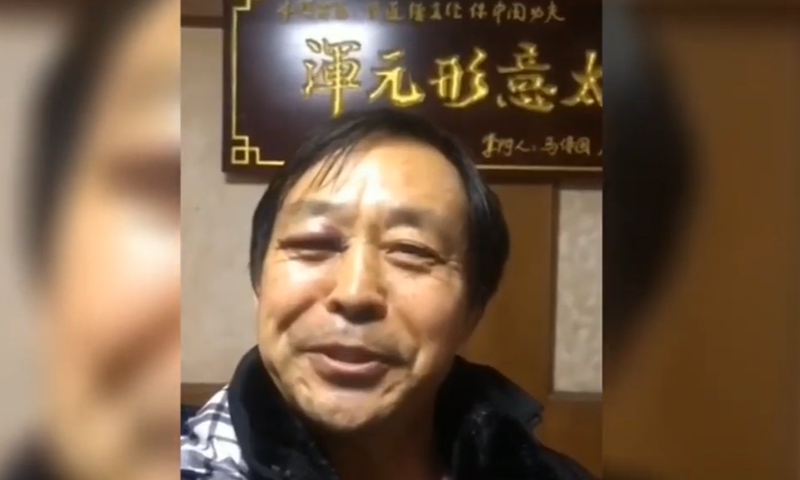Farce of Kung Fu ‘master’ ends as streaming platform announces rectification on his videos
By Cui Fandi Source: Global Times Published: 2020/11/30 0:10:56

Photo: Screenshot of Ma Baoguo's video online
Kung Fu "master" Ma Baogou's reign as China's top web celebrity and most made-fun-of social media character has come to an end after Bilibili, China's YouTube-like streaming platform announced it would "rectify" content posted by Ma Baoguo on Saturday.
Ma had become fodder for countless memes and mocking short videos on multiple social networking platforms, especially Bilibili. Criticism of him has grown along with his fame, accusing him of disparaging traditional culture and promoting "deformed values."
Bilibili published an announcement on Saturday, vowing to "strictly rectify, review, and manage" content related to Ma, which the platform claimed was an act of "assuming social responsibility."
"The criticism and ridicule of Ma is gradually becoming entertainment and values are being diluted." Bilibili wrote, claiming that some people were taking advantage of the 'Ma Baoguo phenomenon' to hype and harvest traffic for profit."
Bilibili said an average of 48.5 derivative, cynical videos that make fun of Ma's hyperbolic posts about his nonexistent prowess as a Kung Fu master were uploaded an hour.
Bilibili's move may have been inspired by editorials published in China's leading newspaper People's Daily and the state media Xinhua News Agency, both of which condemned what they called the "anti-aesthetic frenzy" online, and demanding an end to Ma's "farce."
One of Ma's catchphrases "Mouse Tail Juice" has been registered as a trademark and a company with the same name was registered on Monday. Hundreds of items relating to Ma are for sale on Taobao, China's largest online shopping platform.
"Some of Ma Baoguo's words and deeds are claptrap, swagger, and in the end, a farce," wrote the People's Daily editorial. "The farce must be terminated."
Claiming that he "never intended to become a web celebrity," Ma announced on November 15 that he was retiring from martial arts and would "stay away from the farce." But in the following week he received interviews from media, accepted offers to appear at events, and even announced that he would be playing a Kung Fu master in a movie which he said "will break box office records."
"What do the people behind Ma really want? It is all about business," People's Daily wrote. "Some social media platforms are fueling the hype and it's all about profit."
"If it's just a performance, no one has to pay special attention to it," wrote the People's Daily's editorial, "But when it becomes a 'phenomenon' and is frequently discussed in public, it's necessary to examine what's behind it."
In May, Ma challenged a 50-year-old kickboxing coach to a fight in East China's Shandong Province and was knocked out cold in 30 seconds. He later made his famous video refusing to admit defeat, even while sporting a black eye.
Social media platforms and media organizations are the weathervane of public opinion and changes in public sentiment, and they ought to have the right outlook and "keep the bottom line of values," Xinhua suggested.
Zhu Wei, a communications researcher at the China University of Political Science and Law in Beijing noted that restrictions on vulgar content and malicious web traffic are not only required by law, but are corporate and media social responsibility.
"It's also about protecting Ma and traditional Chinese martial arts," Zhu told the Global Times on Sunday. "Ma wasn't promoting Chinese culture. It's detrimental to the public interest when people are accustomed to entertainment that makes a mockery of traditional culture."
RELATED ARTICLES:
Posted in: SOCIETY